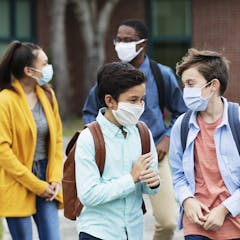
Articles on Pandemic response
Displaying 1 - 20 of 31 articles

The former prime minister and his allies have dodged questions and passed the buck in an inquiry that is meant to give the public confidence that lessons will be learned for the future.

Giving evidence to the COVID inquiry, Boris Johnson’s former adviser exposed the dysfunction of an administration lacking in the expertise needed to manage a crisis.

Now is the time to learn from the COVID-19 response through an action-oriented independent inquiry focused on accountability. Reforms to data generation, access and use are essential.

Both New Zealand and Iceland kept death rates from COVID low, but used different strategies. While New Zealand relied on lockdowns and border closures, Iceland ramped up its testing capacity.

A side-effect of pandemic response measures has been the impact on our mental health. But memory problems are a natural response to the environments created by the lockdowns.

We found most governments were ill-prepared, too slow to act, paid too little attention to the most vulnerable, and were hampered by low public trust and an epidemic of misinformation.

In the first two years of the pandemic, Australia’s COVID elimination strategy was among the most effective in the world. Now we rank second in the world for the most cases per capita.

Making room for the input of children and adolescents in responses to the next pandemic would help maintain their health, education, well-being and more.

During spring and summer, as more people consider exercising outdoors, a trauma- and violence-informed approach to physical activity can help ensure equity, inclusion, safety and access.

We interviewed 80 Australians from a wide range of ages and backgrounds about how the government handled the pandemic. Their responses were mixed.

The Philippines has reported 34,000 deaths in the pandemic. It’s now in its fourth wave and with vaccination levels at just 14%, case numbers continue to soar.

New Zealand continues to pursue an elimination strategy to stamp out community infections with the Delta variant. But it will need incentives and some degree of compulsion to raise vaccination rates.

The nice way to describe a new study suggesting lockdowns haven’t saved lives is that it’s ‘brave’.

The WHO is creating a Global Pandemic Radar – an example of collective intelligence that must learn lessons from this pandemic.

States led by Republican governors generally had higher COVID-19 case and death rates in 2020.

Shoring up surveillance and response systems and learning lessons from how the COVID-19 pandemic unfolded will help the world be ready the next time around.

COVID-19 has presented an opportunity to increase gender equality both in Canada and worldwide. Rebuilding with women at the forefront will help communities succeed post-pandemic.

Nine months into the pandemic, Indonesia has seen serious threats to civil liberties, involving not only privacy but also freedom of expression and of the press in the digital realm.

US president-elect Joe Biden is taking expert advice on how to tackle the US coronavirus crisis. But is that enough?

The state government has enlisted a US software company to deploy a data management system that will speed up contact tracing. But security could be a hitch.
